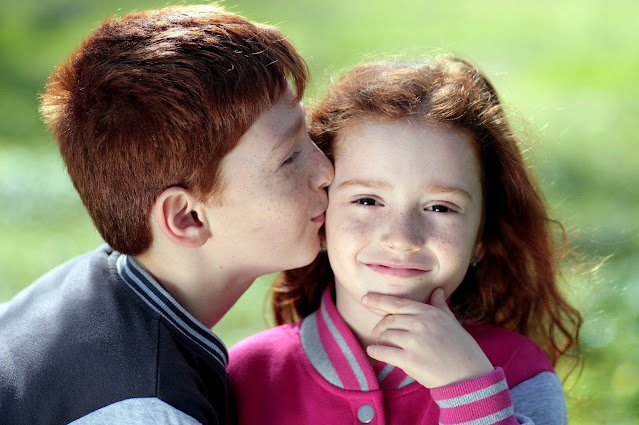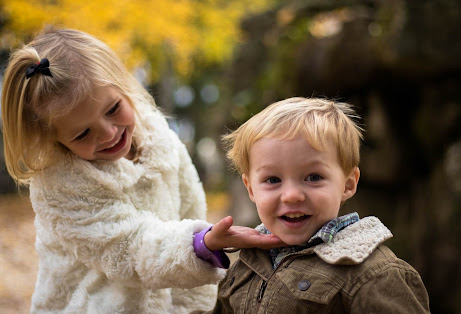Having a sibling with Autism Spectrum Disorder (ASD) is not trivial. The diagnosis of ASD changes the daily life of the whole family, including the brothers and sisters. Cécile Rattaz, psychologist and doctor of psychology at the Languedoc-Roussillon Autism Resource Center, explains how to help other children to thrive and live their lives in a family like no other.How do Living with an autistic sibling?
Explain to your children what autism is
The unspoken or the little discussed events are very often anxiety-provoking for a child. This is why it is important to explain to your children the disorder that their sibling has. Your way. "It does not matter what words are used, whether we are talking about autism, disability or difference, emphasizes Cécile Rattaz. You just need to approach with your own vocabulary what is happening by specifying for example to your children that their brother or their sister develops differently from other children, which he learns at his own pace ".
So by putting words to what is playing, you allow your children to ask questions. "The explanation can be given at any time of education, remarks our specialist. It is not a question either of saying once and for all but of being able to address the question regularly. You can organize, why not, small family talks where everyone can talk about what they want and not just broach the subject of autism. Together we can then look for solutions to any difficulties encountered ".
Make them feel guilty
Other siblings may feel guilty about being healthy; they may also, with good reason, feel out of step with their autistic sibling. If the child with autism is the oldest, his or her siblings may "overtake" him in certain areas. And the more the years go by, the more the gap tends to widen between them and him.
Which can lead to a feeling of guilt. "It is important to remind them that, as in all siblings, everyone has their own pace, advises the expert. They certainly go faster, for example to read a book, but their autistic brother is super good at doing puzzles. By de-dramatizing, you thus break the barrier of guilt. Children can then allow themselves to grow at their own pace. "
Encourage them to be themselves
Naturally, they sense that their parents are worried about their autistic sibling. And say to themselves that it is not worth adding more and causing additional worries for parents. So often they are wise, reasonable and do well in school. In appearance, of course, because like any child, they also need to express their desires, their anger, their joys.
“It is important to give each child in the siblings their rightful place, encourages the expert.” Your children sometimes need to reproach you for things, like any child, for example to be less flexible with them than with their brother. If you feel that your child is not allowing themselves to express how they are feeling, feel free to take the lead in talking to them about how you, as parents, are feeling. By opening the dialogue, children are allowed to express their emotions, the concerns they may have for their brother or sister, their feeling of injustice, etc. "
Avoid that he / she feels responsible for his / her brother / sister
Very sensitive and concerned about the well-being of this brother who is a little different from other children, the siblings often have a tendency to worry and to be very protective. She unconsciously puts herself in an adult's shoes and sometimes forgets to live her life as a child.
"Do not hesitate to tell your children that you are there, at home, to take care of their autistic brother, that there is a team of professionals to support you, lists our expert. The same goes for school. , where they tend to isolate themselves from their friends to stay with their less sociable brother. You can remind them that the teacher and the companion are present and that they can go and play without worry with their friends.
Help them manage the gaze of others
It's hard not to feel ashamed when faces turn on you on the streets, in stores, or when you hear derogatory remarks about your child with autism. So it would be heresy to imagine that your children can feel anything other than shame. "Each child reacts according to his sensitivity, reveals Cécile Rattaz.
It is up to you to lead by example by recognizing that it is quite normal to experience this feeling of shame and by taking into account the sensitivity of your children. If you feel that certain social situations - for example going to the supermarket with their brother or sister - are too difficult for them to live with, listen to them and do not force them to accompany you. Then through experience, your children will learn to distance themselves from the eyes of others. It is like that but we do not care after all. "It is a long process, both for parents and for children.
Find time for everyone
Raising a child with autism requires constant attention, so many parents may feel like they are leaving the rest of the siblings behind. "There is certainly some truth to this, but I would like to reassure parents by reminding them that it is not the quantity of time spent together that counts but rather the quality," explains the psychologist.
Baking a good cake, reading a story, walking the dog can also be very constructive moments for your children as long as they are shared with pleasure. Bedtime is also a key moment where you can ask everyone how the day went, what they liked to do or on the contrary what upset them ".
Find time for everyone
Raising a child with autism requires constant attention, so many parents may feel like they are leaving the rest of the siblings behind. "There is certainly some truth to this, but I would like to reassure parents by reminding them that it is not the quantity of time spent together that counts but rather the quality," explains the psychologist.
Baking a good cake, reading a story, walking the dog can also be very constructive moments for your children as long as they are shared with pleasure. Bedtime is also a key moment where you can ask everyone how the day went, what they liked to do or on the contrary what upset them ".
Support them in their teenage years
Children often grow up to distance themselves from siblings with autism. This is the time for carefree, friends, empowerment and life away from the eyes of parents. Paradoxically while feeling a great wave of freedom, teens may feel guilty for walking away and leaving behind their so different brother.
"Your main mission will be to remind them that everyone is different, that their desire to see their friends is normal and that they can go there without fear, encourages Cécile Rattaz. Don't forget to reassure them about the fate of their autistic brother. by reminding them that he is not alone. Savor this moment because it is precious. And be proud of your children who, thanks to their particular experience, have become sensitive, altruistic and caring beings, in short, beautiful people ".




